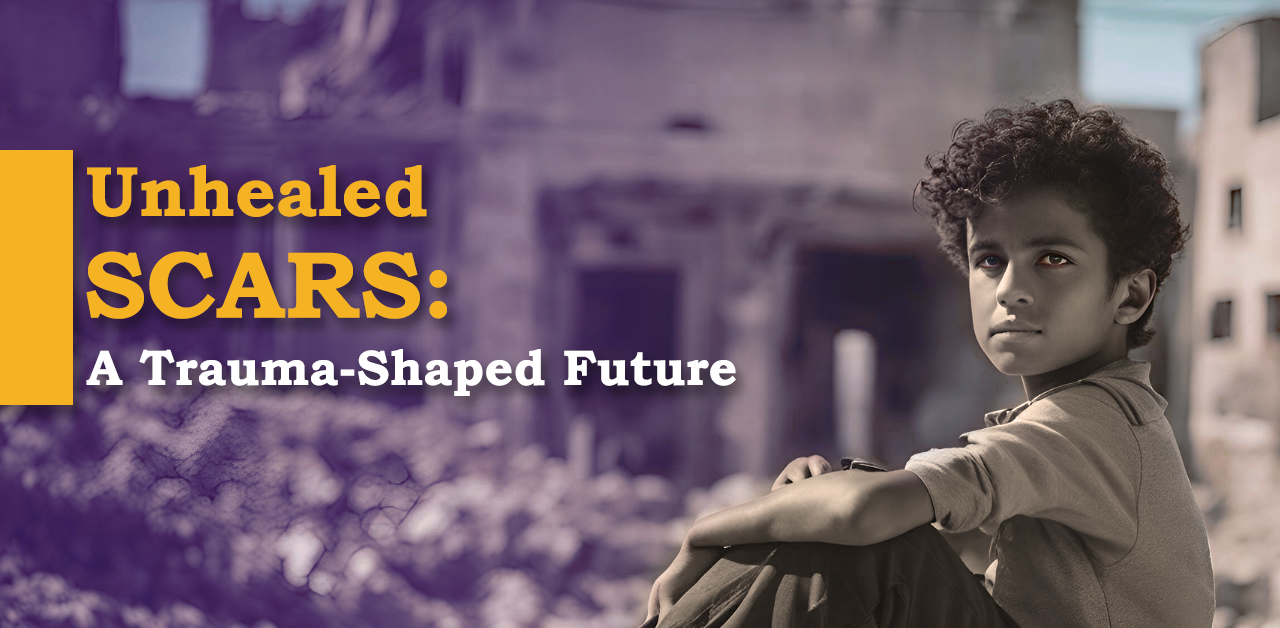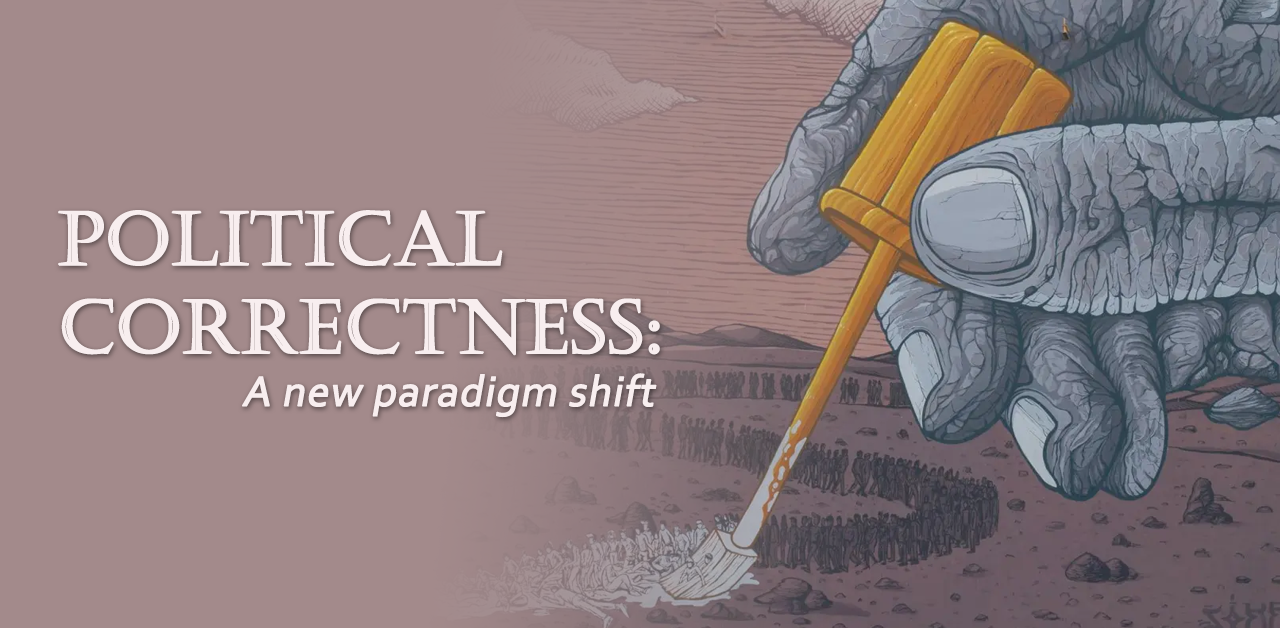Contact Dr. Sammy
+201096761371
 29 Apr 2024
29 Apr 2024
BY: Dr. Ahmad Sammy
Articles
Unhealed Scars: Unresolved Childhood Trauma’s Ripple Effect in Conflict Areas
Imagine a generation raised on the soundtrack of bombs and the sight of destroyed buildings. For numerous youngsters living in conflict areas like Gaza, where constant bloodshed leaves severe emotional wounds, this is their sad reality. Leaving these kids to struggle with untreated trauma has far-reaching effects that go well beyond personal misery and have a significant influence on international society.
The Gaza Case: A Shattered Generation
Research indicates that a startlingly high number of Gaza’s children suffer from PTSD. Mental health problems have long plagued children under the age of 18, who account for 47% of the 2.3 million residents of the Gaza Strip. Before the recent violence, four out of every five kids reported having PTSD, depression, anxiety, or fear. Previous research also showed that an even larger percentage of kids had mental health problems that were impeding their growth and education.
According to reports such as the one published by the Euro-Mediterranean Human Rights Monitor, around 640,000 children in the Gaza Strip have had their homes destroyed or damaged, leaving them without a place to live, and between 24,000 and 25,000 children have lost one or both of their parents. All of this led to an enormous mental health toll on children in Gaza, to the extent that almost 100 percent of these children are in imminent need of mental health and psychosocial support, according to a recent statement by UNICEF.
“The scars of this war are not just physical ones, We’re seeing an enormous mental health toll on children in Gaza. UNICEF estimates that 100 percent of the children here need mental health and psychosocial support.”
Tess Ingram, UNICEF spokesperson | April, 2024
Trauma-Shaped Future: A Worldwide Issue
Childhood trauma can take many different forms if left untreated:
- Mental Health Crisis: Depression, substance misuse, and self-harm are all fostered by unresolved PTSD. The burden on mental health resources has a knock-on effect on healthcare systems throughout the world.
- Cycle of Violence: Kids who witness violence firsthand are more likely to commit acts of violence themselves as adults, which could prolong hostilities, destabilize areas, and raise the possibility of threats to international security.
- Economic Downturn: Traumatized adolescents frequently find it difficult to obtain jobs and make meaningful contributions to society; as a result, they will impede economic growth, which will have an effect on commerce and development on a local and international level.
Worldwide Accountability: Healing the Damage
It is the duty of the international community as a whole to address this problem by putting some of these possible answers into practice:
- More Humanitarian Aid: Provide funding for trauma-informed mental health treatments in areas of violence. Educate local mental health providers so they can handle the unique needs of children affected by war.
- Advocacy and Awareness: Educate people worldwide about the long-term effects of childhood trauma. Put pressure on combatants to give civilian safety—especially that of children—first priority.
- Education and Support: Include curricula on mental health issues in schools located in conflict areas. Give kids safe places to process their experiences and support groups.
Investing in the Future
We run the risk of raising a generation of lost souls with unseen scars if we ignore childhood trauma in war-torn areas. It is not only morally right to invest in their mental health; it is also economically and globally necessary for security. Our ability to mend the scars of war, one child at a time, will determine the health of our world in the future.
Gaza’s children serve as a striking metaphor for a more serious worldwide issue. Through community effort and recognition of the extensive effects of unresolved childhood trauma, we can create a world in which every kid has the chance to recover and flourish.
 15 Apr 2023
15 Apr 2023
BY: Dr. Ahmad Sammy
Articles
Political correctness: A new paradigm shift
Political correctness is a term that has gained widespread usage in recent years, particularly in discussions around language and social norms. It is a term that has been both praised and criticized, with some seeing it as a way to empower marginalized groups and others viewing it as a form of censorship that seeks to suppress free speech. In this article, we will explore the concept of political correctness and its impact on society, particularly in terms of whether it is a window of opportunity for marginalized groups or an attempt to introduce new psychological norms despite any social or historical discrepancies.
What is Political Correctness?
The term political correctness originated in the 1960s and was initially used to describe efforts by the left to promote greater sensitivity to issues of race, gender, and other forms of identity. It was seen as a way to eliminate racism and discrimination in society and to create a harmonious, more inclusive, equitable, and peaceful environment.
Over time, the word has taken on many meanings and has been used in a variety of contexts. While some see political correctness as a way to promote social justice and create equality, others see it as a form of censorship that suppresses freedom of expression and relevant intellectual inquiry.
A key element of political correctness is the use of inclusive language. This means using language that does not hurt or offend marginalized groups such as people of color, women, LGBTQ+ communities, and people with disabilities. Examples of inclusive language include using gender-specific language, avoiding discrimination or stereotypes, and using person-first language when referring to people with disabilities.
In addition to language, political correctness includes changes in culture and behavior. For example, it may involve altering interpersonal relationships, such as not making inappropriate jokes or comments that could be perceived as offensive.
Is Political Correctness a Window of Opportunity for Marginalized Groups?
One argument in favor of political correctness is that it creates a window of opportunity for marginalized groups by promoting inclusive language and behaviors, thus aiming to create a just society where all are treated with respect and dignity.
For example, using gender-specific or gender-neutral language can facilitate participation for non-binary people who do not identify as male or female. This can create a warmer environment for non-binary individuals who may feel marginalized or excluded in a predominantly binary society.
Likewise, using human-centered language when referring to people with disabilities can help increase awareness and understanding of disability issues. By using language that is more about people than about disability, we can affirm the concepts of respect and inclusion for people with disabilities.
Political correctness can help prevent racism and discrimination in society as well. It helps create a more just and equal society through awareness and understanding of issues related to race, gender, and other identities and hence can help to create a more just and equitable society.
The new face of global society
Although there are many arguments in favor of political correctness, there are also criticisms of the concept. One criticism is that political correctness is an attempt to present new psychological models in the face of many social and historical benchmarks.
Critics say that political correctness tries to impose on people a particular worldview that is based on a narrow set of ideological beliefs. By promoting certain forms of language and behavior, political correctness seeks to create a society that conforms to these ideological beliefs, regardless of whether they are supported by social or historical evidence.
Critics argue that the use of gender-neutral language is not supported by scientific evidence and is instead based on a particular ideological viewpoint. According to them, this viewpoint seeks to impose a particular understanding of gender on society which does not reflect the biological differences between men and women.
Similarly, other critics believe that political correctness can stifle free speech and intellectual inquiry. They claim that the emphasis on inclusive language and behaviors can create a climate of political correctness in which certain topics or ideas are considered taboo or off-limits. Consequently, this might create a backlash among those who feel that their views and beliefs are being suppressed, which can lead to a polarization of society and a breakdown of civil discourse.
Conclusion
Political correctness is a complex and multifaceted concept that has both positive and negative aspects. While it can promote inclusivity and combat discrimination and bias, it can also be seen as an attempt to impose a particular worldview on society and restrain free speech.
Ultimately, the impact of political correctness on society will depend on how it is implemented and how it is perceived by different groups. It is important to strike a balance between promoting inclusivity and allowing for open dialogue and intellectual inquiry. By doing so, we can create a society that is both just and free.
 26 Mar 2023
26 Mar 2023
BY: Dr. Ahmad Sammy
Articles
The Role of Technology in Changing Modern Human Behavior
Technology has played a significant role in shaping modern human behavior. It has changed the way we communicate, work, learn, and socialize. From the advent of the internet to the rise of social media platforms, technology has transformed the way we live our lives. In this article, we will explore the impact of technology on human behavior and how it has led to both positive and negative changes.
One of the most significant changes brought about by technology is the way we communicate. With the rise of social media platforms, messaging apps, and video conferencing tools, communication has become faster, more convenient, and more accessible. People can now connect with others from anywhere in the world and at any time. This has led to the formation of online communities and the sharing of ideas and information across borders. However, it has also led to a decline in face-to-face communication and the development of interpersonal skills.
Technology has also changed the way we work. With the rise of remote work, people can now work from anywhere in the world as long as they have an internet connection. This has led to more flexible work arrangements and increased productivity. However, it has also led to a blurring of boundaries between work and personal life, which can lead to burnout and other mental health issues.
The way we learn has also been transformed by technology. Online courses, e-learning platforms, and educational apps have made learning more accessible and convenient. People can now learn new skills and knowledge from the comfort of their own homes. However, the quality of online education and the lack of interaction with teachers and peers can lead to a decline in the quality of education.
Technology has also impacted our social lives. Social media platforms have allowed people to connect with others and share their experiences. However, it has also led to the rise of cyberbullying and online harassment. The constant need for validation and the pressure to present a perfect image online has also led to mental health issues such as anxiety and depression.
In conclusion, technology has had a significant impact on modern human behavior. It has changed the way we communicate, work, learn, and socialize. While there are many benefits to the use of technology, it has also led to some negative changes. It is essential to strike a balance between the use of technology and the need for face-to-face communication, interpersonal skills, and mental health.
